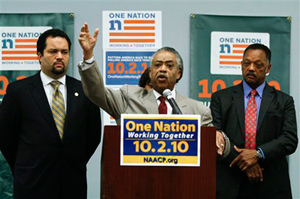Racism Reconsidered
In Obama’s America, negative connotations of race are but a relic of the past. But does this mean that it’s now fair game to play the race card in ways that might have been considered politically incorrect before Obama’s election? Is it now fair game to play the race card in ways that might have been considered politically incorrect before Obama’s election?
Whether the election and presidency of Barack Obama has brought about lasting political change has yet to be seen. What is visible so far is that by electing Obama our nation has made a major breakthrough by overcoming racial and ethnic prejudice. For some, Obama’s presidency means that we’ve gotten beyond race, and therefore we’ve also gotten beyond racism. After all, we have a president who identified as African-American on the 2010 census. In Obama’s America, negative connotations of race are but a relic of the past. But does this mean that it’s now fair game to play the race card in ways that might have been considered politically incorrect before Obama’s election?
According to NAACP President and CEO Ben Jealous, the answer is absolutely not. In fact the NAACP voted unanimously last week to pass a resolution condemning the tea party movement for tolerating racist statements made by some of its members. “Expel the bigots and racists in your ranks or take the responsibility for them and their actions,” Jealous said. The NAACP “will no longer allow you to hide like cowards and hide behind signs that say ‘Lynch Our President’ or anyone else.” According to the NAACP website, the resolution comes after “a year of vile, antagonistic racial slurs and images” generated at events that have received high-profile media coverage. Although tea party organizers are disputing claims of racism and want the resolution withdrawn, it will go to the NAACP’s national board of directors for a full vote in the fall.
Mark Williams, a spokesman for the Tea Party Express, said last Wednesday that it was unfortunate that the NAACP had chosen to “profiteer off race-baiting and fear mongering” when it could be doing so much to help the African-American community. Some political figures agree, including Jesse Jackson and Al Sharpton, who have both downplayed this issue. Williams took a sharp turn from these leaders, however, when he insisted that “Jesse and Al want their piece of it. The slave traders of the 16th century should have been as good at exploiting Africans as these people are, because it’s just disgusting.” Williams argues that it’s really the NAACP that’s being racist.
Jealous and the NAACP find language such as Williams’ both absurd and abhorrent. They believe that our president’s election is indeed a step forward in terms of American race relations and that it doesn’t grant us the privilege of forgetting hundreds of years of oppression. That’s why Jealous and the NAACP contend that race and racism affect people’s everyday lives in meaningful ways. For instance, in 2008 The Washington Post reported that “the average black person in America is 447 percent more likely to be imprisoned than the average white person, and 521 percent more likely to be murdered. Blacks earn 60 cents to the dollar compared with whites who have the same education levels and marital status. The black poverty rate is nearly twice the white poverty rate. Blacks tend to die five years earlier than whites; the infant mortality rate among black babies is nearly 1½ times the rate among white babies.” Jealous asserts that some members of the tea party use racist imagery that plays on stereotypes and denies these kinds of facts.
Accordingly, the point of the NAACP’s tea party resolution is that using racial words and images in derogatory ways remains unethical, uncivil and, most of all, ironic. For Jealous and the NAACP, a political space in which traditional notions of racial superiority and racism are dead should also be a space in which rhetoric that compares our president to Hitler, civil rights leaders to slave traders, or taxpayers to “niggars” is condemned.
With both sides firing off statements accusing the other of being either racist or more racist, some questions remain. Some are simple, like who can be considered racist? It can be argued that we throw around words like racism and racists so much today that they no longer have clear meanings. A more precise meaning is provided by the Oxford English Dictionary Online. “A racist is someone whose words or actions display racial prejudice or discrimination … towards people of other races, especially those felt to be a threat to one’s cultural or racial integrity or economic well-being.”
Other questions are a bit trickier, like who can call someone else a racist? Political correctness would deem that those who have been marginalized historically get the privilege. But in today’s post-racial political environment, it appears that the privilege to call out a racist belongs to everyone. That’s fine if we are all using the same standards to measure discrimination — or lack thereof. Unfortunately, this is not often the case. Social psychologist Richard Eibach at Yale University found that whites and blacks often employ different yardsticks to measure racial equality: White people measured progress by comparing the present and the past, while people of color were more likely to evaluate racial equality in terms of an idealized future.
If people have entirely different perceptions based on their social experiences and positions, then what does it really mean to call someone a racist? Is invoking this term tantamount to a pro-justice rallying cry, a divisive tool, a public relations spectacle or a fundraising effort? In this case it could be any of the above. Regardless, these charges of racism should not be ignored, for they remind us of the need to measure ourselves and our interests in a diversifying world—with all its political incorrectness—and the impact when our worlds and yardsticks collide.
Your support matters…Independent journalism is under threat and overshadowed by heavily funded mainstream media.
You can help level the playing field. Become a member.
Your tax-deductible contribution keeps us digging beneath the headlines to give you thought-provoking, investigative reporting and analysis that unearths what's really happening- without compromise.
Give today to support our courageous, independent journalists.





You need to be a supporter to comment.
There are currently no responses to this article.
Be the first to respond.